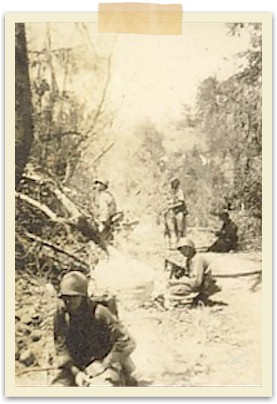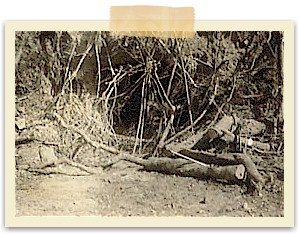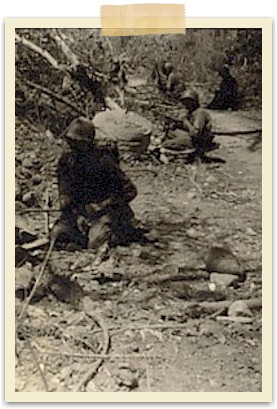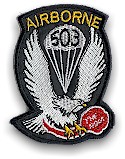- 2 -

The
young men had nothing to eat for three days except for what was in four
paraffin-sealed olive drab boxes of K rations they had stuffed in the large room
pockets in the legs of their baggy fatigue trousers before they jumped.
These combat rations usually contained a tin of cheese or eggs and ham, a
tasteless biscuit, a piece of chocolate that was covered with an unappetizing
white crust thought to be caused by the hot damp climate.
If there had been any water on the island, you could mix the package of
lemon powder or some bouillon with it, but water was too precious to be used for
that just now. The soldiers, even
though they were constantly hungry, ate the K rations with little enthusiasm.
There were no set meal times and the men broke into the sealed packages
at the odd moment when they could. The
concentrated, tasteless food only made them thirstier.
A
large area surrounding Wheeler Point had been very nearly stripped of vegetation
after the massive bombing before the 503d's daring assault. As Browne and the
assembled platoon leaders looked out from the promontory,
the entire company defense area could be easily seen.
Browne showed them the ground that D Company was to defend on the western
side of Cheney Ravine, tying in
with F Company that was defending the eastern side of the ravine. He pointed out
the entire company defense sector that continued southwest through Wheeler Point
ending just north of Battery Wheeler where the company tied in with C Company
defending atop the 12" gun battery.
Short
as the S3's order was, it was very nearly sunset by the time he had completed
it. There clearly would not be
enough time for Lieutenant Turinsky or his platoon leaders to fully comply with
the orders because it obviously would be dark long before the platoons could
move into the defensive positions Browne had outlined. Because time was short,
the defense was hastily organized and incomplete. The 503d had a long-standing
policy that, in effect, prohibited night movement.
Once it was dark the platoon and squads would not move except in very
minor adjustments or at your own risk in a serious emergency; to do otherwise
was to risk being shot by your own comrades.
All of the troops were trained to treat any movement at night as hostile
and to fire without warning. Because
of this rule the company never got completely into the positions they were
ordered to occupy on the regiment's perimeter line.
3/
|






